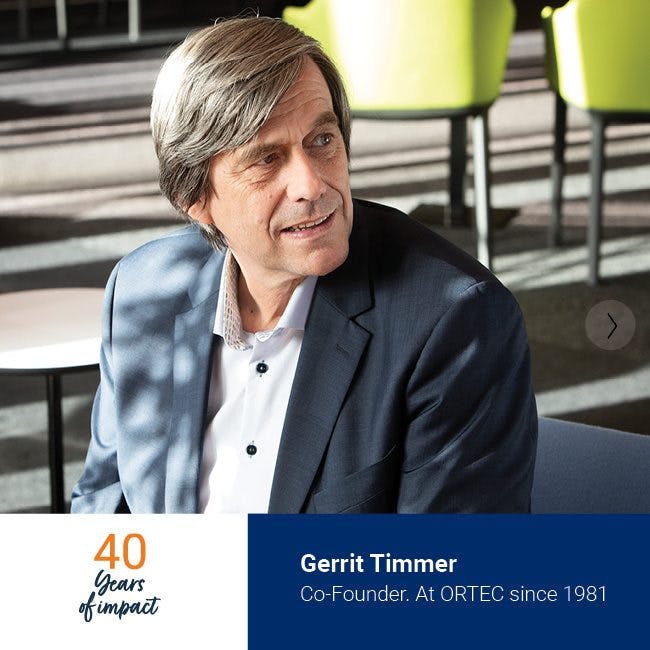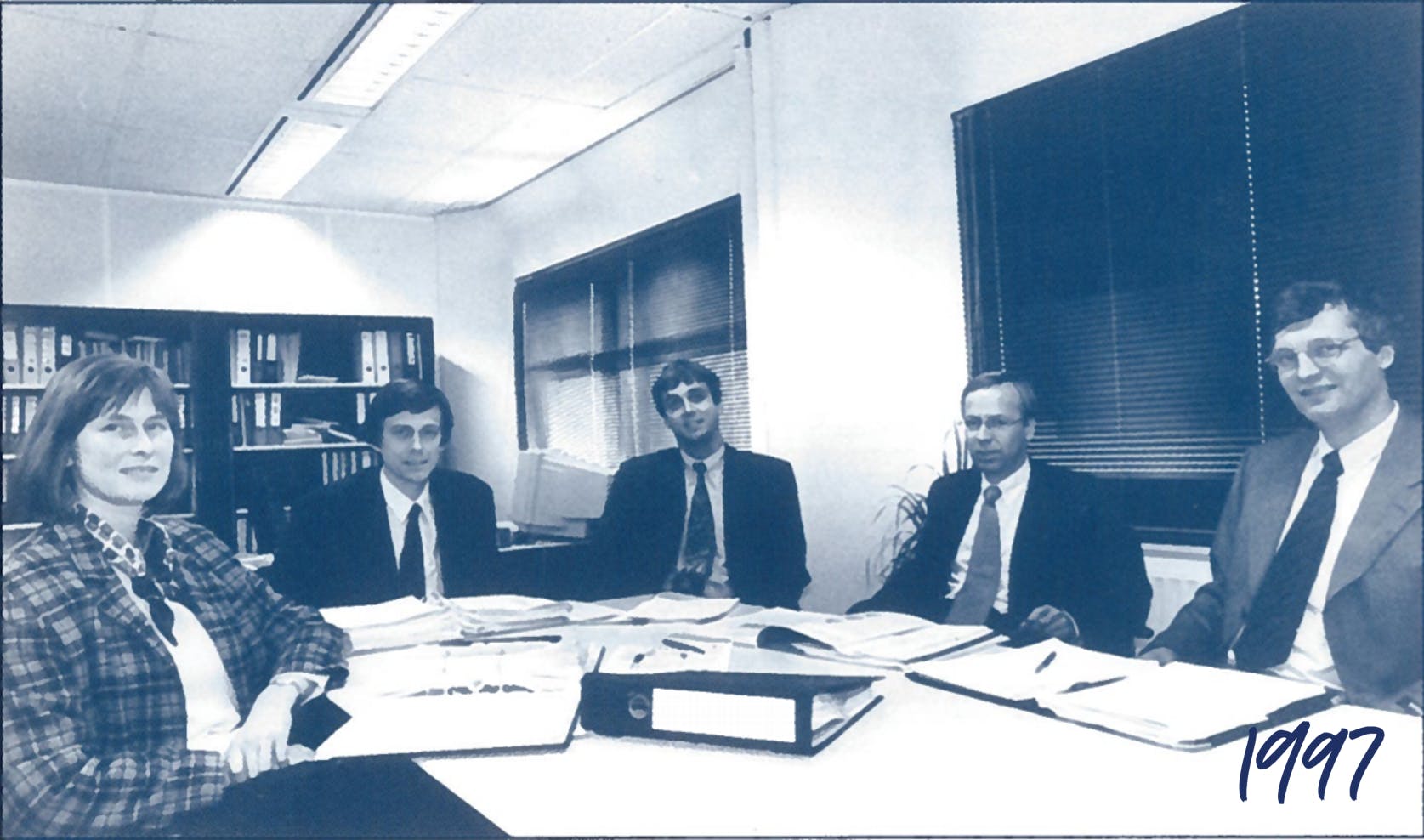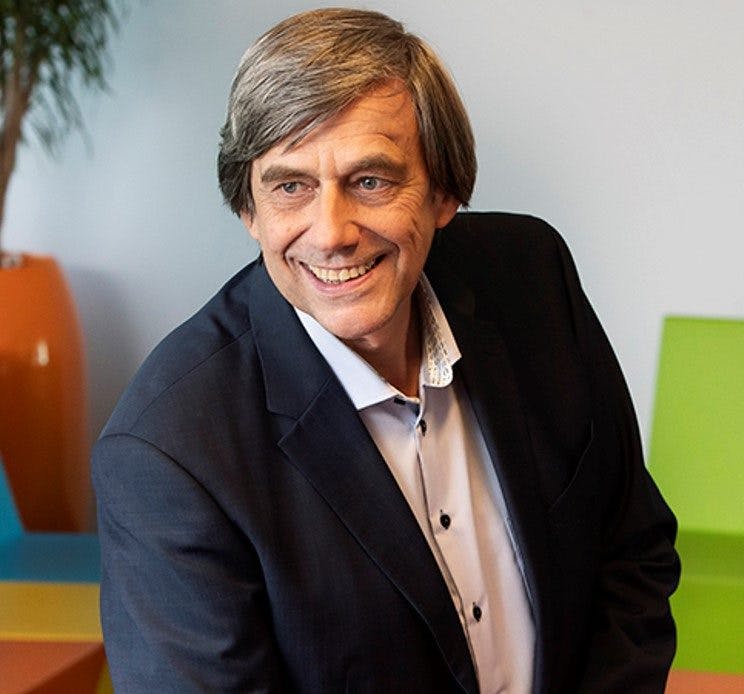40 years of impact: an interview with ORTEC founder Gerrit Timmer
Read time: 6 minutes“Loyalty goes two ways: loyalty towards our employees, and loyalty towards our customers. We never give up on our customers”
April 1, 2021 - “I remember using an Apple II in the 1980s” says Gerrit Timmer, co-founder and now Chief Science Officer (CSO) at ORTEC. “But not for big projects – for those we needed bulky mainframes that cost millions. It was for small calculations, and for writing text. Typewriters were not quite that handy!” No digital mobile networks, no proper laptops and, instead, huge stacks of paper: this not-so-distant past seems unimaginable. But Gerrit and four other math wizards had an appetite for challenges and innovation – so 40 years ago, our founders embarked on the adventure of a lifetime. Countless great projects later, ORTEC has much to be proud of: together with our customers, we have made an impact that goes beyond mere business.
An interview with Gerrit Timmer, co-founder and Chief Science Officer (CSO) at ORTEC

April 1, 1981
ORTEC’s impact began with the logistics operations of the retail company Schuitema, now part of the second largest retail group in the Netherlands. "What we did was exceptionally innovative," says Gerrit with a proud smile. “There was some buzz in the scientific literature about how you could make store delivery more efficient, but there were no successful applications in routing – until we developed ours.” Gerrit recalls that in just ten years, the logistics costs of Schuitema went down by “dozens of percentage points.” But it’s the significance of such projects for society at large that is astounding: “the world of Retail & Wholesale is now in its essence structurally different than when we started working with supermarket chains. So much more on the operational side is now done in real time. And we were absolutely ahead in this area.” In an interview from 1991 (Dutch link), another co-founder of ORTEC, Aart van Beuzekom, foresees developments now commonplace: route planning as a standard, and accurate ETAs for customers.
Below a picture from 1997 showing the then shareholders of ORTEC. From left to right: Marjon Gredt, Gerrit Timmer, Ruud Gruson, Guus Boender and Aart van Beuzekom.

Four Decades of Improving the World
After more than 25 years as a university professor, Gerrit is seldom left speechless – but when asked to list just a few selected highlights of ORTEC’s impact over the past 40 years, he is silent for a while. Which story should one choose when there are so many to be proud of?
When he starts again, Gerrit first focuses on the main ingredient for growing an enterprise for 40 years: “loyalty. Which goes two ways: loyalty towards our employees, and loyalty towards our customers.” This is what we mean by ‘beyond mere business’: at ORTEC, “we’ve always been interested in the project itself, and in its outcome.” We are motivated by innovating, pursuing knowledge, creating value for society at large and ultimately improving the world we live in. “We never give up on our customers. This is what convinces them to stay with us, decade after decade.”

Gerrit Timmer
"Atlanta is one of the main logistics hubs of the United States. It was the ideal place to be."
Profit: Optimizing Costs to Invest Better
In 2000, Michael van Duijn, now CEO of ORTEC, crossed the Atlantic to establish an office in Atlanta. “There were two reasons for that choice,” recalls Gerrit. “Coming from academia, we wanted to be close to the Georgia Institute of Technology. And most importantly, Atlanta is really one of the main logistics hubs of the United States: the headquarters of one of the world's largest companies were just around the corner. It was the ideal place to be.”
The headquarters were those of none other than The Coca-Cola Company, and ORTEC was asked to solve their incredibly complicated logistics puzzle. An article from 2015 (Dutch link) reports that just in North America, our solution saved Coca-Cola $45 million a year. “Let me also add another perspective: Coca-Cola has one of the largest truck fleet in the world,” Gerrit says. “It’s not just about the billions they can spend more efficiently. It’s also about driving fewer kilometers, reducing CO₂ emissions.” In a huge roll-out that Gerrit remembers vividly, we implemented our solution in many other countries where Coca-Cola operates. This means more efficient logistics on a global level: “that big a company, distributing the same amount of goods, using less fuel. Consider the difference this makes for the environment.”
“It’s not just about the billions the customers can spend more efficiently. It’s also about driving fewer kilometers, reducing CO₂ emissions.”
Planet: Around the World in 1000 Trucks… or Not?
The decrease in CO2 emissions we achieve across our customer base is in fact one of the key figures by which we measure ORTEC’s impact on the world, as shown in our Annual Report. “Just between 2008 and 2011, our optimization of TNT Express’s freight network reduced their CO2 emissions by 283 million kilograms,” remembers Gerrit with pride. And if it seems a figure difficult to grasp in concrete terms, Gerrit is happy to offer a practical example: “it’s like driving a thousand trucks around the Earth for seven times.”
Thanks to the algorithms we developed, in the same years TNT Express saved more than €200 million, as well. Reconfiguring their air and road network was a complex problem, which we tackled together with Tilburg University. In 2012, this earned us and TNT the Franz Edelman Award: “the most prestigious annual international award for the best applied work in the field of Operations Research and Management Sciences,” explains Gerrit.
In their introduction to the 2012 finalists of the Franz Edelman Award, the editors of Interfaces praise the OR projects presented for “enabl[ing] their organizations to respond effectively to dramatic change.” In the midst of the coronavirus pandemic, almost a decade later, the importance of Operations Research resonates more than ever: McKinsey reports that in the past year alone, “the share of e-commerce grew at two to five times the rate before COVID-19”, which we can assume will have consequences for the parcel delivery market, as well.
“Work schedules are as much a mathematical puzzle as they are challenging from an interpersonal point of view.”
People: Workforce Scheduling, a Collective Balancing Act
We can’t mention the pandemic without contemplating the impact workforce management solutions have had on hospitals across the world in the past year. In this Harvard Business Review article from July 2020, the authors argue that non-standard working schedules, like the ones experienced by hospital workers, need to cater to the individual needs of each employee to be successful in terms of employee engagement and wellbeing. Discussions that pertain to work schedules, Gerrit explains, “are as much a mathematical puzzle as they are challenging from an interpersonal point of view,” because they are ultimately tied to the softest KPI of all: happiness.
Take the 2001 strikes of Dutch Railways (NS) workers: a newly introduced schedule was protested with such fervor, that the Dutch trains stopped running for days. The Dutch Railways’ works council negotiated fiercely to devise an alternative schedule, and wanted ORTEC as their trusted advisers (Dutch link). “Everyone was arguing with everyone, and we had to come up with a plan that would have collective support,” recalls Gerrit, who has a soft spot for this specific project. The ultimate workable solution, presented in this paper from 2005, is a methodology that Dutch Railways still uses today. It was appreciated by the employees because it resulted in better work packages for them, and it was achieved at no extra cost. Actually, it reduced yearly personnel costs by almost $5 million.
We are motivated by innovating, pursuing knowledge, creating value for society at large and ultimately improving the world we live in.
Proud as Punch
- From five mathematics wizards as founders to over 1085 geniuses being employed;
- From the first to the 1200th customer;
- From the Netherlands to worldwide;
These are all wonderful milestones. But something to be even more proud of is the impact we make on the world, together with our customers. As ORTEC, we are committed to the three sustainability pillars: People, Planet & Profit. We look beyond mere business.

About the interviewee
After 25 years as professor in business econometrics at the Vrije Universiteit Amsterdam and decades of being CEO and/or CFO of ORTEC, Gerrit Timmer is now Chief Science Officer and member of the board of the company he co-founded in 1981. As CSO, Gerrit teaches at the Education Factory and at The Analytics Academy, a partnership between the University of Amsterdam and ORTEC. He is widely recognized as a thought leader in Operations Research and Applied Mathematics.

